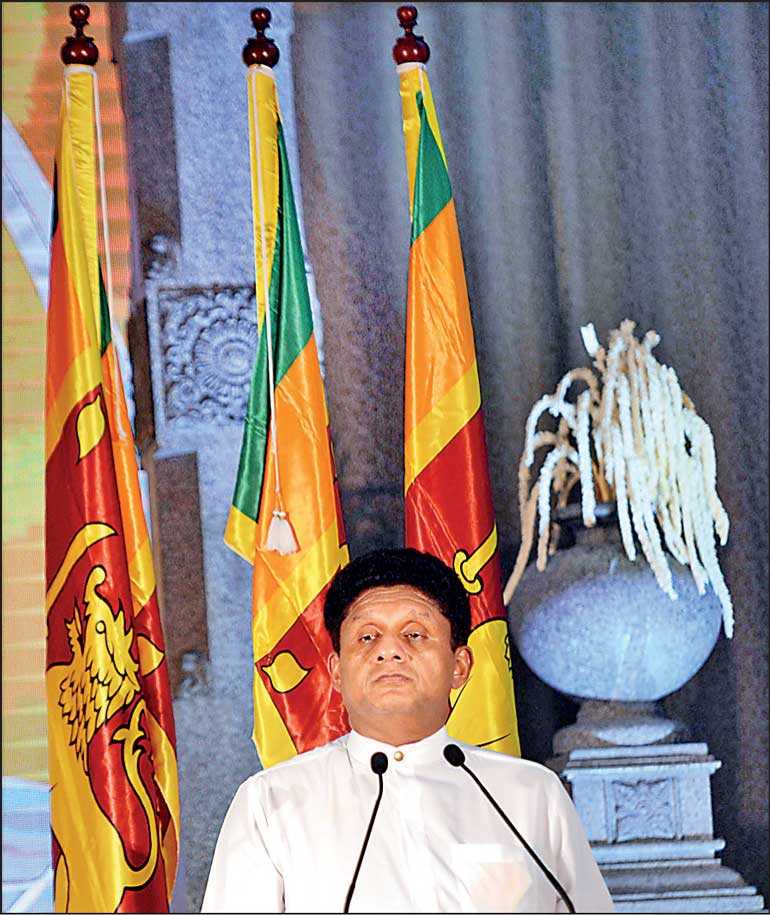Monday Feb 23, 2026
Monday Feb 23, 2026
Friday, 1 November 2019 00:00 - - {{hitsCtrl.values.hits}}

New Democratic Front (NDF) presidential candidate Sajith Premadasa yesterday rolled out an election manifesto which outlined a raft of reforms, which he insisted would drive forward the economy by delivering consistent policies, ensuring democracy, protecting the rule of law, increasing welfare and promoting minority rights.
According to the manifesto, if elected, an administration with Premadasa as its President would seek to get national policy papers approved by Parliament and Cabinet as well as create a national consensus on key policies. The document also pledges to establish an independent debt office to effectively manage public debt and promises to regulate foreign loans while borrowing from the cheapest sources.
The policy document points to economic and fiscal reforms, claiming that Premadasa will speed up the enactment of the new Securities and Exchange Commission Act to better regulate markets and also plans to speed up listing government securities on the Colombo Stock Exchange (CSE).
The manifesto also spells out tax reforms by amalgamating VAT and NBT into a 15% tax, increasing the VAT threshold for companies from Rs. 12 million to Rs. 50 million per annum and widening the PAYE tax bracket from Rs. 100,000 to Rs. 150,000.
Premadasa also pledges to create a Rs. 10 billion venture capital fund to encourage and invest in tech start-ups while SMEs will be encouraged via the ‘Enterprise Sri Lanka Scheme’ and other incentives.
The presidential hopeful made these pledges at a ceremony in Kandy where he launched his election manifesto. Premadasa first visited the Mahanayake Thero of the Asgiri Chapter to present him with his manifesto and pledged to revisit all international agreements made by Sri Lanka in the past, asserting that he would only retain ones which favoured the country if he was elected.
Premadasa laid out his vision to build a nation where the people were sovereign, while the territorial integrity and political freedoms of all were protected. He stated that the foremost position given to Buddhism would remain unchanged and that all religions and ethnicities would be protected and nurtured by his administration. He claimed that if elected, his Government would be public servants and act as custodians, pledging not to appoint anyone who was corrupt.
“This is our responsibility and duty,” he said.
The candidate also promised to give priority to human rights and added that a new administration headed by him would ensure that the political, economic and cultural rights of all Sri Lankans were met. “Our end goal is to make Sri Lanka a secure and prosperous nation for all with equality in wealth distribution and the end of corruption,” he said, declaring that the era when those in power reaped benefits for themselves at the taxpayers’ expense must end.
Addressing those gathered at the launch, Premadasa stated that Sri Lanka had never bowed down, nor would it in the future, to foreign powers. He revealed that he would bring about a ‘Sri Lanka first’ foreign policy and reorient the focus of the Ministry of Foreign Affairs towards economic diplomacy.
He also drew on the Government’s policy of creating a prosperous nation where all Sri Lankans would be united, pointing out that he sought maximum devolution of power within a unitary Sri Lanka. Continuing on about the Government’s constitutional reform process, the manifesto says a Premadasa administration would speed up the process and bring in a new Constitution with stakeholder input which will be approved through a referendum. The proposed Constitutional reforms include a second chamber to Parliament.
“We will protect the unity, territorial integrity, sovereignty and political independence of our motherland and bring decision-making closer to the people. Maximum devolution of power within an undivided and indivisible Sri Lanka will be implemented. Devolution of power will become meaningful. Inefficiency and waste will be reduced. Devolution of power will ensure that we create true unity among all Sri Lankans, not only in law and in practice, but also in our hearts,” page 16 of the manifesto read.
“This is the beginning of a public-centric movement ... on 16 November, we will create a revolution in Sri Lanka’s democratic history,” he said, highlighting that judicial independence, harmony and good governance were essential.
The manifesto indicates that Premadasa plans to create an independent public prosecutor, appointed through the Constitutional Council.
“We will move the judicial interpretation of the Constitution away from the Supreme Court to a new Constitutional Court which will also adjudicate disputes between different levels of Government. The number of judges and prosecutors is to be increased and there will be new legislation to reduce delays in the justice system.”
Premadasa pointed out that he had experienced the effects of terrorism firsthand and pledged to build a powerful national security apparatus to keep Sri Lanka safe. According to his manifesto, a National Security Council will be legally established and competent individuals will be appointed to it. A new National Security Strategy will be drafted on recommendations made by experts after an audit of the existing security architecture.
The NDF candidate claimed that unity among Sri Lankans was paramount to national security, thus a zero tolerance approach to religious extremism and violence would be adopted. New laws will be brought in to combat hate speech and extremism while the ICCPR regulations are to be used under Human Rights Commission (HRC) guidelines.
Premadasa’s manifesto, titled ‘Sajith’s Social Revolution’, proposes a raft of anti-corruption measures, including making money laundering an offence under the Bribery Act. The document pledges to strengthen the Bribery Commission, COPE and COPA and promises special courts and prosecutors to expedite the process. Structural change to the public service is also pledged, with the aim of improving its efficiency and quality of service.